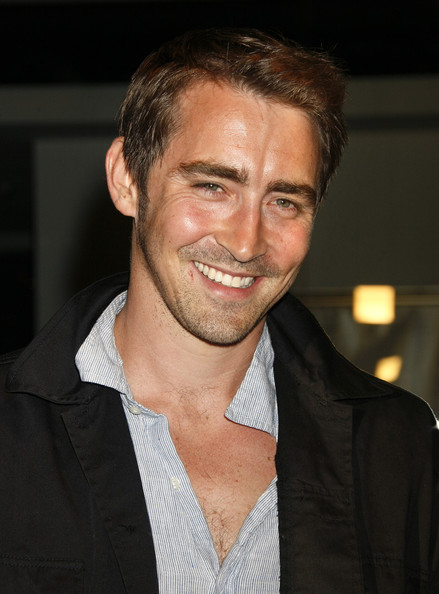 MIRAMAR, NEW ZEALAND — In the final few weeks of filming for “The Hobbit: The Battle of the Five Armies,” a handful of journalists visited Peter Jackson’s set at Stone Street Studios near Wellington, New Zealand to do a final round of interviews during filming.
MIRAMAR, NEW ZEALAND — In the final few weeks of filming for “The Hobbit: The Battle of the Five Armies,” a handful of journalists visited Peter Jackson’s set at Stone Street Studios near Wellington, New Zealand to do a final round of interviews during filming.
The invitation included TheOneRing.net. The pack of journos were given a lot of interviews in a short amount of time with the agreement with Warner Bros. to hold them until just before the final film. The veil is lifted and here is the interview, with minimal commentary. (Assume the less good questions aren’t from TORn!)
We met in the mess hall, empty except for us on a windy day. Pace is even more handsome in person than expected, dressed casually but smartly and he gave very thoughtful answers — as you will read — and appeared to be thinking while he spoke. In fact, at the time the interview seemed extraordinary, especially as he talked about his character. Some of these phrases could be engraved and hung somewhere. Reading through it more than a year later, I hope fans enjoy it as much as I do.
We were fresh from Weta Workshop, Academy Award winner Richard Taylor as well as interviewing Academy Award winner Dan Hennah and having a tour of the offices of the Art Department where we saw concept art and models and props of all kinds.
Here is the conversation:
LEE PACE: My name is Lee Pace. I play Thranduil.
MEDIA: Now, describe the first time you saw the throne in actuality.
PACE: I guess you’ve seen it now.
MEDIA: We saw concept art of it. So we haven’t seen what it actually looks like, but what does it—
PACE: Am I allowed to say anything?
MEDIA HANDLER: You can– We’re on film three, so—
PACE: Okay, we’re on to film three. I don’t want to give anything away.
JOURNALISTS: We just know a whole bunch of people die, so—
MEDIA HANDLER: They’re embargoed. They’re embargoed.
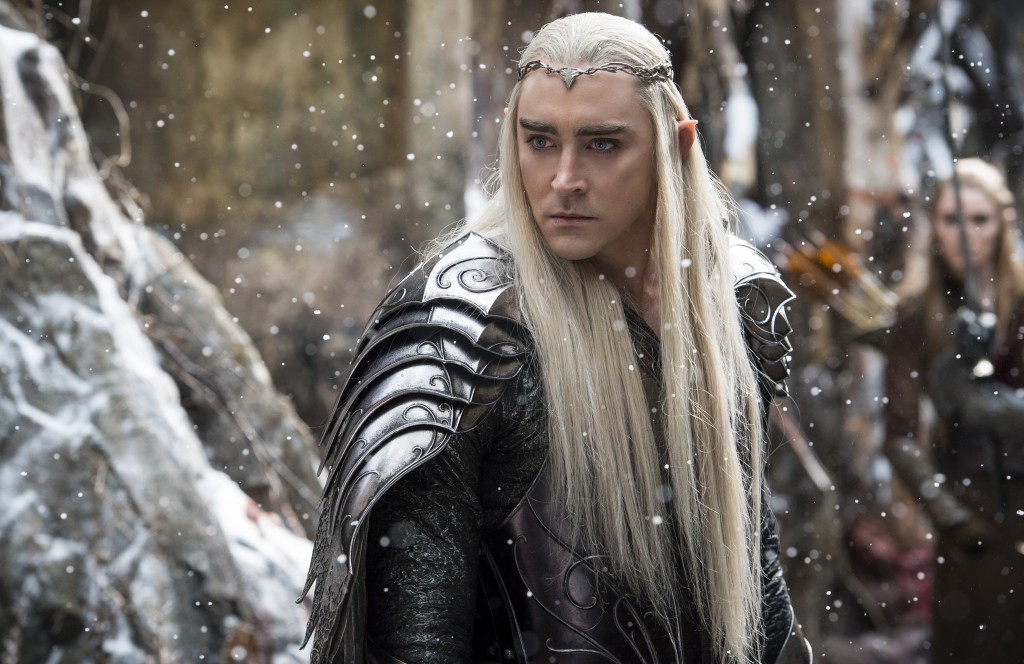 PACE: Okay. So you know what happens in the book. You’ve actually read the book, so—
PACE: Okay. So you know what happens in the book. You’ve actually read the book, so—
MEDIA: No, I was very impressed with the concept art. And so what does a prop like that do when you see it. To you, does it inform everything around the performance?
PACE: Well, it was actually the first scene I shot, was sitting on that throne. So it informed a lot, because you find yourself sitting up really high in the center of a room, and there are these massive antlers coming out of my head, effectively, which is– So the crown, the costume, all of that stuff, I found– I had had lots of ideas about the character, but then to actually find yourself living in it, what’s the right word for it? It was fantasy. It actually felt like that. It felt like I was in another Earth.
MEDIA: A middle one, perhaps?
PACE: Yeah, yeah.
MEDIA: What were the things that first came to mind when you thought about how you would play the part? What did you want to bring to it?
PACE: Well, I did a lot of research about what Tolkien was interested in and found lots of interesting leads. And then I, in a very free-form way, went down those leads and just found lots of different paths.
 I’ve been working on it for a long time now, it’s three years. And I’ve had lots of different ideas about the Elven king in that time, and they are kind of independent movies, in different layers, I believe, in my conversations with Philippa and Fran and Pete. But it’s everything from the idea that he is locked away.
I’ve been working on it for a long time now, it’s three years. And I’ve had lots of different ideas about the Elven king in that time, and they are kind of independent movies, in different layers, I believe, in my conversations with Philippa and Fran and Pete. But it’s everything from the idea that he is locked away.
It began with this idea that he is locked away in a very dangerous place. He’s an elf on the other side of the wild. And from what I read, he’s still there. Where everyone else went west, all the other elves went west, he’s remained. And that’s an interesting mystery for me to unravel as the one playing him. What kept him there? What is it about Mirkwood, that dangerous, corrupted forest that felt at home to him?
There was that, there was the idea that he likes to have a good time, that he’s fun. You know what I mean? That he’s powerful, privileged, wise, very, very old, and he’s fought in all of the great battles of Middle-earth. And he’s now locked himself away in a fortress, away from the trouble of the world. That’s interesting. There’s an interesting psychology. There’s a wisdom to it, but there’s a detachment to it.
And then I collected symbols, I collected things that I found were interesting about– A tiger was a good symbol for him because he’s dangerous, he’s not your friend. Tigers, they are beautiful, they are complicated, they are vicious. That’s how he is.
He’s like a diamond. He’s cold and hard and rich. And he cares about being that way. Formidable. Like a great tree in the forest. A very old, strong tree. It’s not going anywhere. But it’s very much alive. It’s not a stone. So there’s been lots of– And the cave. When I saw that throne for the first time and I saw Alan Lee’s– I saw their concept art, I found that very interesting.
MEDIA: So when you first signed on to the job and now– We all know how the script morphs and changes, and you have a pretty extensive third film presence, has it been a fun process for you, from then to now?
PACE: Yeah, it’s been great. Yeah. It’s been a really rewarding experience, being able to work on something for such a long time. And being able, in that time, to get deeper with it and more complicated, unravel different layers of him. That’s been very, very interesting, because every– I guess it’s winter down here, but summer back home I come down to Wellington and get back into it. But it has changed. It’s interesting, from the first ideas, how much the character has changed.
And what I’ve come to is this– The Elves, in a close Earth parallel, would be zen to what they are. They are very connected to nature, but there’s something about him that’s corrupted. And in that zen way, I believe that grief has corrupted him, greed has corrupted him, wanting things, hunger has corrupted him.
It’s what separates him from Galadriel. She is the most powerful being in Middle-earth, he is the most powerful warrior alive in Middle-earth. And that’s very interesting, the way these two very old elves have lived their life. One has lived his life killing and protecting, and that’s a corrupting thing.
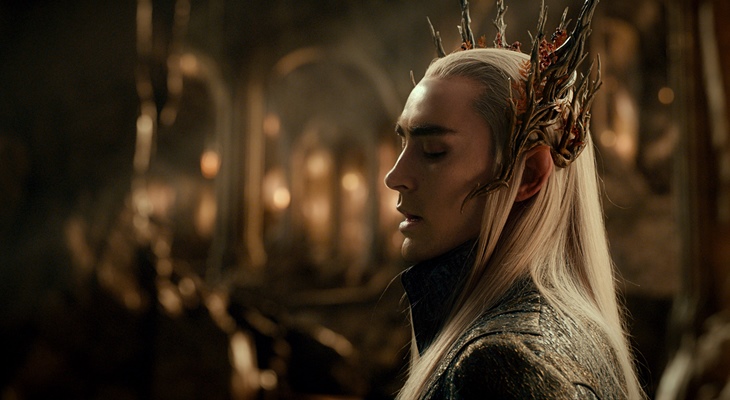 MEDIA: Did you reverse engineer any bit of your performance, whether it’s movements or anything, from watching Orlando’s work in the first trilogy, or any of the other elves in the first trilogy? Or is that also—
MEDIA: Did you reverse engineer any bit of your performance, whether it’s movements or anything, from watching Orlando’s work in the first trilogy, or any of the other elves in the first trilogy? Or is that also—
PACE: (interrupts) Absolutely. Yeah. Yeah, they really defined what that was in Lord of the Rings. Absolutely. Orlando is a perfect elf. He’s perfect at it. He’s so good at it. There’s a stillness to him. And something that he reminded me of this time around was that the Elves are different. They are not people. They don’t think like people. They don’t behave like people. Their actions aren’t the way our actions are. So it’s a very useful reminder to just keep it other, keep it in a different place, kind of set it off.
And then, of course, Cate and Hugo Weaving are also perfect elves. And Liv Tyler, too. She’s just so magical in that movie. You watch them and– Yeah, you do. “Reverse engineer” is a perfect way to describe it because it’s trying to figure out—
But he’s different, the Mirkwood Elves are different. I think Tolkien describes them as less wise but more dangerous than the Elves in other parts of Middle-earth. I love that. I think that’s very, very cool.
MEDIA: So how do you balance that with the zen-ness you were talking about, that Elves have as a general trait?
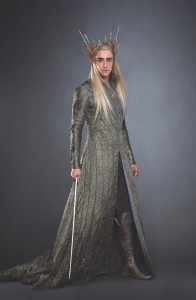 PACE: Well, the way I fill that gap is thinking about a tiger, thinking about a bear. They are absolutely in tune with nature. They are natural things, but they’ll kill you. If you cross their path, you’re at their mercy. And there is a zen to that. It happens, that’s the natural order. If you offend a bear, if you make a bear feel uncomfortable, then can you blame him for biting your head off?
PACE: Well, the way I fill that gap is thinking about a tiger, thinking about a bear. They are absolutely in tune with nature. They are natural things, but they’ll kill you. If you cross their path, you’re at their mercy. And there is a zen to that. It happens, that’s the natural order. If you offend a bear, if you make a bear feel uncomfortable, then can you blame him for biting your head off?
You knew what was coming. And that’s been actually a really fun thing with Thranduil. He’s powerful, he is a formidable figure. And his choice to not engage in the battles is not because he’s afraid, it’s because he simply doesn’t want to.
And the difference that he sees very clearly after living for three thousand years is all the rest of these people are going to die. They are all going to die at some point. Whether they die today on the battle or ten years from now when they go home or a hundred years from now, they are all going to die. He’s not.
When he catches Thorin coming through the woods, I think actually it is a very sensible thing to do. These thirteen dwarves come through to go wake a dragon, it’s going to cause nothing but trouble and grief. You stop them from doing that. It’s an irresponsible thing to do. And I think he’s one of the stewards of Middle-earth, and he stops them. And as far as he is concerned, he’ll wait till the dragon dies to get the white gems that he wants. He’ll outlive them all.
MEDIA: So patience is a defining factor in the entire character, the ability to let things happen around and know that he’s going to still be standing regardless of what happens around him?
PACE: Yeah, that patience, isolation, stillness, it’s that– If you’ve ever been in the woods in the middle of winter and it just is absolutely timeless. When you don’t see any other buildings around and it’s just snow and quiet and absolute stillness, you feel like it has been like this for thousands of years. That’s what I think about Mirkwood. It’s old. It’s an old, old place, and he’s a part of that. These halls are very old, and he’s known to be older than that.
From the great elves of the past, that’s where he grew up. So there is a tradition that he brings into Mirkwood. And I believe patience is a part of that.
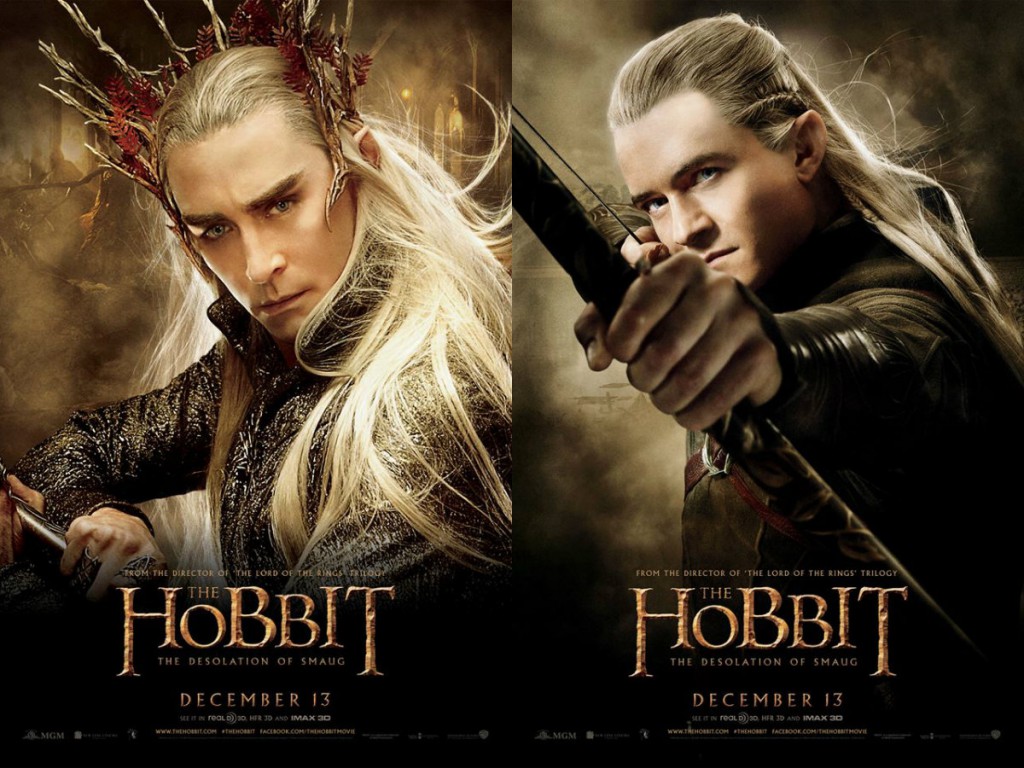 MEDIA: What did it mean to you to join this creative company of players and become a part of this world and its mythology?
MEDIA: What did it mean to you to join this creative company of players and become a part of this world and its mythology?
PACE: It’s a fantastic opportunity to be with creative people. And that’s on every single level, from the people working at Weta who– My brother actually moved out here and he’s working at Weta now. And he loves it so much because he is working on dwarf chariots and making weapons and painting things. It’s such a creative place. I’ve never seen a creative place like this.
From Pete, all the way down. And everyone on set, all the actors, all the people working the costumes, these massive sets that’ll go up overnight. And they are just so imaginative. It’s like I read in the books, the first movie, the fire in the woods, it’s two or three paragraphs. But it becomes this incredible, climactic moment in Peter’s imagination.
MEDIA: As an actor– We’ve spent two days on the set now, we’ve just come from Weta Workshop and we were are the Art Department, and seeing this kind of ecosystem at work, as an actor, are you constantly aware of the stuff that’s going on around here, about all the processes?
PACE: I am, because I’m interested in it. Because to see something that is just so imaginative like this, and free, very loose, it’s very organic the way it works, and it’s very rare that a Hollywood movie of this size is like that. So I’m fascinated with it. I’m fascinated with all the moving parts about it. And there’s so many interesting artists at work that it’s hard not to get stopped, to be like, “What are you working on right now? What’s on your mind? What’s happening?”
MEDIA: What is the difference, working in an ecosystem like this where there’s a spread, as opposed to on a very unique movie like The Fall where it’s all coming from Tarsem, basically, and it’s coming from this one strange genius as opposed to a genius who’s spreading everything out around him?
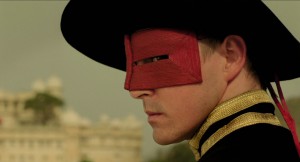 PACE: Well, I don’t know. I would say it was more similar than it was different, to be honest. On both this and on that, I found myself in the hands of a really great director, and I feel like what my job is to do is to say, “What do you need?” “What do you need to make the movie? What do you need to make this character? How can I help?” And when you do that, you find out more about what’s on Pete’s mind, what’s on Fran’s mind, what’s on Philippa’s mind. Then you can understand what your place in that is better.
PACE: Well, I don’t know. I would say it was more similar than it was different, to be honest. On both this and on that, I found myself in the hands of a really great director, and I feel like what my job is to do is to say, “What do you need?” “What do you need to make the movie? What do you need to make this character? How can I help?” And when you do that, you find out more about what’s on Pete’s mind, what’s on Fran’s mind, what’s on Philippa’s mind. Then you can understand what your place in that is better.
With Tarsem too, it was just– I remembered when he pitched to me what that movie was. I was like, “What?” I didn’t even totally understand the story, but I was so taken with– And he showed me all these visuals that he had in mind, but I was so taken with his unique sense of storytelling that I was like, “Great. Whatever you need. You tell me what to do.” And that relationship between a director and an actor is a very interesting thing, very fascinating thing. So it’s my job to hear what they need and inspire them in a way, see what I can– Help them understand the character better, so that they are able to shoot it.
MEDIA: Have you given thought– This may be a little frivolous, but you have obviously thought about your character a lot. Have you given thought to what he was doing during the Lord of the Rings films?
PACE: Well, during the battle, he was fighting. He was fighting in the north. Well, he does have an active present because he sent Legolas.